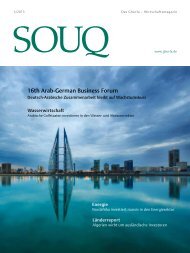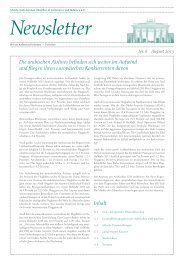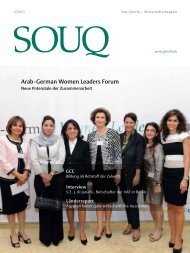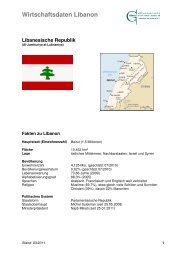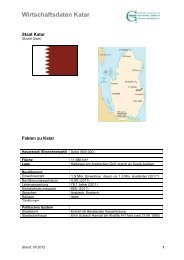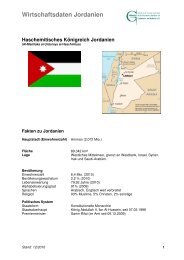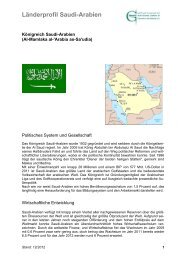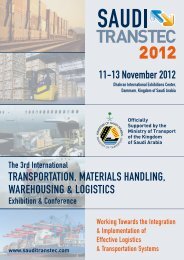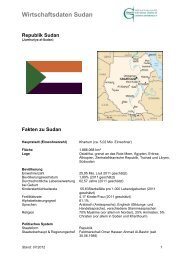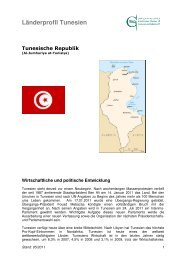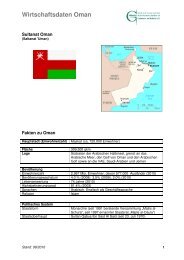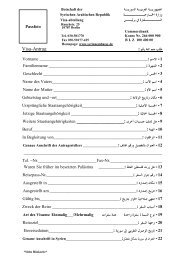Saudi-Arabien Wirtschaftshandbuch Saudi Arabia Business ... - Ghorfa
Saudi-Arabien Wirtschaftshandbuch Saudi Arabia Business ... - Ghorfa
Saudi-Arabien Wirtschaftshandbuch Saudi Arabia Business ... - Ghorfa
Erfolgreiche ePaper selbst erstellen
Machen Sie aus Ihren PDF Publikationen ein blätterbares Flipbook mit unserer einzigartigen Google optimierten e-Paper Software.
134<br />
men. Diese sind also mit ihrem Einkommen nicht steuerpflichtig,<br />
ausländische Selbständige jedoch schon.<br />
Steuersätze<br />
Mit einem einheitlichen Steuersatz von 20% werden alle<br />
Einkünfte, die in <strong>Saudi</strong>-<strong>Arabien</strong> erzielt werden, besteuert.<br />
Es handelt sich bei Unternehmen um eine Einkommensbesteuerung<br />
nach Abzug der abzugsfähigen Ausgaben.<br />
Bei Unternehmensbeteiligungen bezieht sich<br />
dies auf den ausländischen Kapitalanteil. Bei Unternehmen<br />
der Erdgasindustrie liegt der Steuersatz bei 30%,<br />
bei denen der Erdölindustrie bei 85%.<br />
Withholding Tax/Quellensteuer<br />
All diejenigen Personen, die ihren Wohnsitz in <strong>Saudi</strong>-<br />
<strong>Arabien</strong> haben und der Besteuerung unterliegen, müssen<br />
bei der Steuerbehörde eine Steuernummer beantragen<br />
und Steuererklärungen einreichen. Unternehmen,<br />
die keinen Sitz in <strong>Saudi</strong>-<strong>Arabien</strong> haben, aber Einkünfte<br />
erzielen, unterliegen der Quellensteuer. Dies sind z.B.<br />
Einkünfte aus Lizenzverträgen. Hier ist der saudische<br />
Zahlende verpflichtet, die Quellensteuer von der Zahlung<br />
an den ausländischen Unternehmer einzubehalten<br />
und an die Steuerbehörde abzuführen. Diese Quellensteuersätze<br />
sind detailliert geregelt und sind für<br />
– Vermietung von beweglichen Sachen 5%;<br />
– Lizenzen und Leistungen des ausländischen<br />
Mutterunternehmen oder von anderen<br />
Konzerngesellschaften 15%;<br />
– Managementgebühren 20%;<br />
– Kauf von Flugtickets, Luft- und Seefracht,<br />
internationale Dienstleistungen im Bereich<br />
Telekommunikation 5%;<br />
– Bei anderen Leistungen nicht höher als 15%<br />
des Auftragswerts.<br />
–––––––––––––––––––––––––––––––<br />
tAx lAw<br />
The <strong>Saudi</strong> tax law differentiates between tax and Zakat.<br />
Foreign companies must pay corporate income tax whilst<br />
<strong>Saudi</strong> citizens and companies, if they are owned by <strong>Saudi</strong>s,<br />
need to pay Zakat.<br />
The central <strong>Saudi</strong> tax office, the Department for Zakat<br />
and Income Tax, is responsible. Whilst the corporate<br />
income tax in <strong>Saudi</strong> <strong>Arabia</strong> represents the taxation of<br />
profits, Zakat is paid as a principle 2% of the available<br />
working capital. From an economic point of view, both<br />
the taxpayers and Zakat payers pay more or less the same<br />
amounts. On 1.8.2004, the new tax law came into effect in<br />
<strong>Saudi</strong> <strong>Arabia</strong> (Royal Decree No. M/1 dated 15.1.1425H<br />
(6.3.2004)) which governs the taxation of foreign persons,<br />
namely natural and legal persons.<br />
taxpayers<br />
The following are subject to tax<br />
– corporate entities located in <strong>Saudi</strong> <strong>Arabia</strong>,<br />
depending in the foreign capital level;<br />
– natural foreign persons, residing and working in<br />
<strong>Saudi</strong> <strong>Arabia</strong>;<br />
– persons who do not reside in <strong>Saudi</strong> <strong>Arabia</strong> but work<br />
in a company in <strong>Saudi</strong> <strong>Arabia</strong>;<br />
– persons who do not reside in <strong>Saudi</strong> <strong>Arabia</strong> but<br />
generate revenue from <strong>Saudi</strong> <strong>Arabia</strong>;<br />
– persons who work in the field of national gas<br />
investments;<br />
– persons who work in the <strong>Saudi</strong> crude oil business sector.<br />
In this connection, the definition of the place of residence<br />
and the place of work are important; natural persons who<br />
are in the country for more than 183 days a year are assumed<br />
to have a place of residence. The definition of the<br />
place of work leads to the exemption from tax on the income<br />
of foreign workers working in <strong>Saudi</strong> <strong>Arabia</strong>. These<br />
workers do not need to pay tax on their income, however<br />
foreign self-employed persons do.<br />
Tax rates<br />
All income generated in <strong>Saudi</strong> <strong>Arabia</strong> is subject to a<br />
uniform tax rate of 20%. For companies, this is taxation<br />
on income after all deductible expenditure has been deducted.<br />
In the case of company interests, this refers to the<br />
foreign capital share. For companies in the natural gas industry,<br />
the tax rate is 30%, and for companies in the crude<br />
oil industry 85%.<br />
withholding tax<br />
All persons whose place of residence is in <strong>Saudi</strong> <strong>Arabia</strong><br />
and who are subject to taxation need to apply for a tax<br />
number from the tax office and submit tax returns. Companies<br />
who are not located in <strong>Saudi</strong> <strong>Arabia</strong> but generate<br />
revenue here are subject to withholding tax. This could be<br />
e.g. income from licensing agreements. Here, the <strong>Saudi</strong><br />
payer has a duty to hold back the withholding tax from



